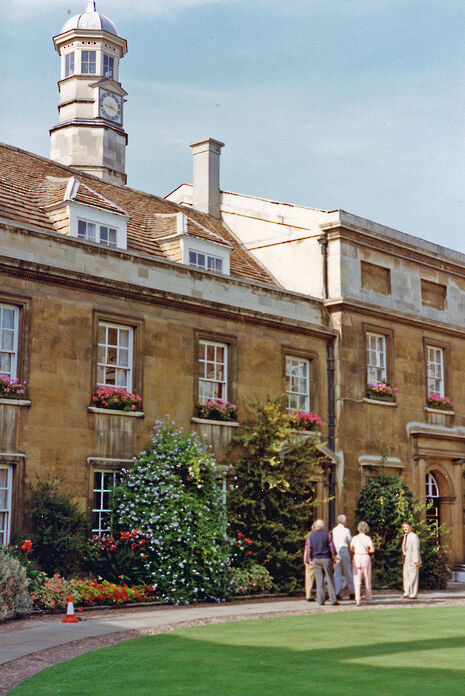This is what it’s like to be Jewish in Cambridge
An anonymous columnist reminds us that while Cambridge in many respects may offer a positive experience for Jewish students, recent events show that anti-Semitism is still prevalent

I’ve spent the last seven weeks talking about anti-Semitism and Jewish experience around the world. However, Cambridge itself, as both a city and a university, is a unique place for Jewish students. This manifests itself in many bad things (like everywhere), whether that be by political prejudice or spray-painted swastikas. But, happily, on talking to some Jewish students in Cambridge, the consensus is that Cambridge is a very good place to be Jewish – and even when it isn’t, the experience is at least unique.
There are as many Jewish experiences in Cambridge as there are students. But whether it be through religion, a sense of community or culture, what really stands out is that Jewish students in Cambridge, in most contexts, don’t have be afraid to show or talk about their identity.
First, it’s perhaps best to reflect on the fact that things are far from perfect. For many, the most challenging and potentially hurtful experiences involve the politics of Israel and Palestine. One student told me that he had been involved in pro-Palestinian activism through his family for most of his life, but upon meeting fellow pro-Palestinian student activists, he found that his religion and cultural background made many people distrustful. He commented that while negative attitudes against Jews in general are not acknowledged, and often explicitly denounced, by such groups, there is a background assumption that all Jews are complicit in the actions of Israel, and pro-Palestine rhetoric is often mixed with inflammatory anti-Semitic rhetoric.
“The vibrant Jewish community in Cambridge is a source of a sense of belonging for many students”
There have also been multiple publicly covered cases of anti-Semitism related to the university in the last year. Initially, what comes to mind is the horrific incident in Christ’s College, where multiple Jewish students were physically assaulted and insulted with slurs, as well as the University’s reaction, which many saw as playing down the anti-Semitism of the incident. More recently, the propagation of flyers denying the Holocaust appearing on multiple days on the Sidgwick Site, as well as spray-painted swastikas on Jesus Green, is unquestionably alarming.
But it would really be a shame if these kinds of stories were the only thing that marked Jewish experience in Cambridge. Luckily, they are not – the majority of people who got back to me talking about their experience of being a Jewish student were positive.
The vibrant Jewish community in Cambridge is a source of a sense of belonging for many students, whether that be through JSoc (the central society for Jewish students), or various unofficial friendships that are formed based on a common background. One person told me that she was first intimidated about whether she was ‘Jewish enough’ coming from a secular family, but was positively surprised by the wide variety of Jewishness that Cambridge’s student community exemplifies. Even though different Jewish traditions disagree about whether converts or patrilineal Jews are ‘real’ Jews, such exclusion isn’t present in the Cambridge community.
There are, however, many practising religious Jews in the student body. One student told me that Jewish religious practices, like observing shabbat, are sometimes difficult to explain to friends who aren’t necessarily aware of why many observant Jews don’t turn on lights or work on Saturdays. However, she mentioned that the easiest people to talk to about religion are often from the Islamic Society – “You can relax about sounding normal and just compare the weird bits of religion”. Cambridge doesn’t have a dedicated shop for Kosher products, but Derby Stores on Derby Street has a dedicated section for kosher products, and many colleges specifically prepare kosher formal food for students who request it.
Even in other UK universities, many Jewish students feel actively threatened by acts of anti-Semitism and prejudice – the relative merits of Cambridge as a good place for Jewish students can hardly be overstated. However, recent events show that anti-Semitism isn’t a historical footnote even in such a relatively safe space for Jews. Thus it can be hard to tell how exactly non-Jewish people should act. I’m just one Jew, and can hardly prescribe a universally acceptable behaviour programme, but there are many things non-Jews can do to make Jewish students feel safer. Apart from, fairly obviously, refraining from being an anti-Semite, listening to the experiences of Jewish students and taking them seriously is imperative. There are other injustices in the world but that doesn’t make anti-Semitism a first-world problem that can just be ignored. We are not making all of this up
 News / Copycat don caught again19 April 2024
News / Copycat don caught again19 April 2024 Interviews / ‘People just walk away’: the sense of exclusion felt by foundation year students19 April 2024
Interviews / ‘People just walk away’: the sense of exclusion felt by foundation year students19 April 2024 News / AMES Faculty accused of ‘toxicity’ as dropout and transfer rates remain high 19 April 2024
News / AMES Faculty accused of ‘toxicity’ as dropout and transfer rates remain high 19 April 2024 Theatre / The closest Cambridge comes to a Drama degree 19 April 2024
Theatre / The closest Cambridge comes to a Drama degree 19 April 2024 News / Acting vice-chancellor paid £234,000 for nine month stint19 April 2024
News / Acting vice-chancellor paid £234,000 for nine month stint19 April 2024




